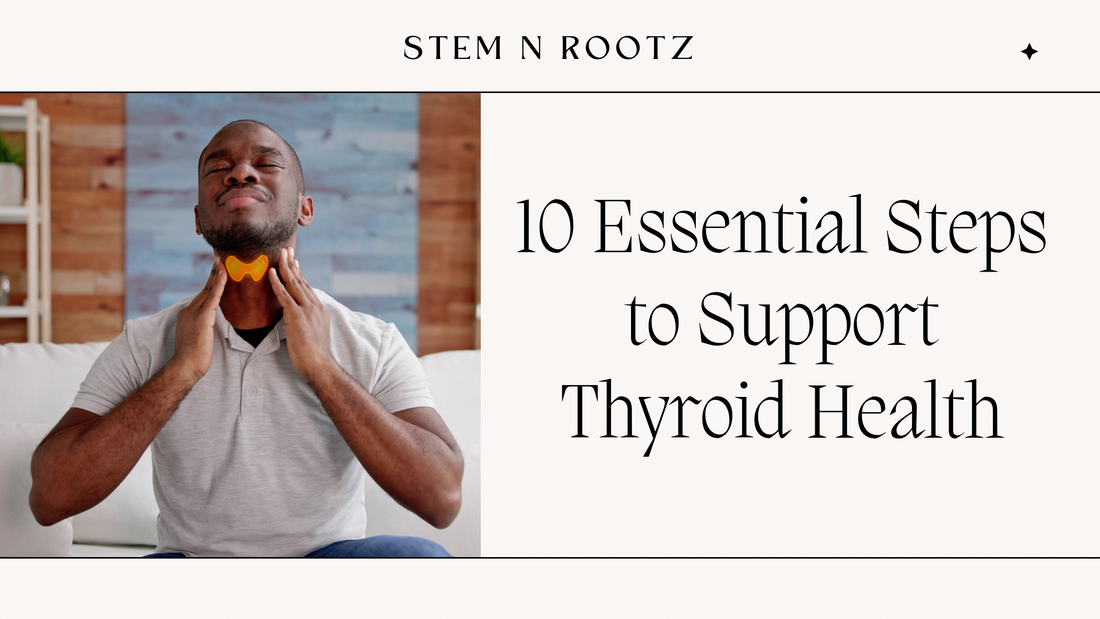
A Natural Protocol for Hashimoto’s Thyroiditis: 10 Essential Steps to Support Thyroid Health
Hashimoto’s thyroiditis is an autoimmune disorder in which the body’s immune system mistakenly attacks the thyroid gland. Supporting thyroid function naturally requires a multifaceted approach one that focuses not just on hormones, but also on the immune system, gut health, stress, and nutrient balance. Here are ten science-supported strategies to help manage and improve thyroid health:
Step 1: Eliminate Gluten to Calm Autoimmunity
Autoimmunity lies at the root of Hashimoto’s. Gluten is a known trigger due to its impact on gut permeability via the protein zonulin, which opens tight junctions in the intestinal lining. This allows molecules to leak into the bloodstream, triggering immune attacks. Eliminating gluten completely is a foundational step. Advanced gluten sensitivity testing is now available in Canada and may help assess your unique response.
Step 2: Lower Stress to Protect Thyroid Function
Chronic stress elevates cortisol, which suppresses thyroid hormone production and fuels autoimmune flare-ups. Cortisol spikes at night can also cause midnight hunger and disrupt sleep. Support adrenal balance by incorporating calming rituals, adaptogenic herbs, and a light protein-rich snack (like hemp seeds or nut butter) before bed to stabilize nighttime blood sugar and cortisol.
Step 3: Replenish Key Nutrients (Iodine & Selenium)
Iodine is necessary for thyroid hormone synthesis, but it must be balanced with selenium to avoid toxicity. In some cases, short-term supplementation of iodine (up to 800 mcg) may be used under practitioner guidance. Natural sources include kelp, bladderwrack, and a variety of sea vegetables. Selenium-rich foods like Brazil nuts and wild-caught fish are essential for T4 to T3 conversion and immune modulation.
Step 4: Optimize Magnesium
Magnesium glycinate (300–500 mg at night) supports over 300 enzymatic functions, including thyroid hormone conversion and blood sugar regulation. It also promotes relaxation and improves sleep—two key factors for autoimmune healing.
Step 5: Cook Cruciferous Veggies to Reduce Goitrogens
Cruciferous vegetables (e.g., kale, broccoli, cauliflower) contain goitrogens, which can interfere with thyroid function if eaten raw in large amounts. Cooking or steaming them reduces this effect while preserving their nutritional benefits. Focus on moderation, not elimination.
Step 6: Include Clean Carbs for Hormone Conversion
Thyroid hormone conversion requires glucose. A moderately low-carb diet (~30% of calories) that includes root vegetables like sweet potatoes, squash, and beets can support healthy T3 levels while keeping blood sugar stable.
Step 7: Balance Blood Sugar to Protect the Thyroid
Insulin resistance and thyroid dysfunction go hand in hand. High blood sugar increases systemic inflammation, while low blood sugar causes cortisol surges both disrupt thyroid hormone output. Support stable blood sugar with whole foods, protein, fiber, and movement.
Step 8: Heal the Gut to Calm Autoimmune Attacks
About 70% of the immune system resides in the gut. Leaky gut (intestinal permeability) allows endotoxins to escape into the bloodstream, which can trigger autoimmune reactions. Support gut healing with mucilaginous herbs like slippery elm and marshmallow, fermented vegetables, and nutrient-dense root vegetables. Many benefit from following an AIP (Autoimmune Protocol) diet as a foundation.
Step 9: Prioritize Selenium for Antibody Reduction
Selenium deficiency is widespread in Hashimoto’s and compromises thyroid hormone metabolism. Studies show that selenium supplementation (200 mcg/day) can lower TPO antibodies and inflammation. Food-based selenium is preferred when possible.
Step 10: Address the Cortisol–Blood Sugar–Thyroid Loop
Low blood sugar spikes cortisol, which suppresses the pituitary’s signal to produce thyroid hormones. Chronic stress also damages thyroid receptor sensitivity. Reducing stress through lifestyle changes, breathwork, herbal support, and proper sleep is critical to break the cycle and restore thyroid function.
Hashimoto’s requires more than just medication it demands a whole-body approach. By focusing on these ten foundational areas, you can reduce autoimmune activity, restore thyroid hormone balance, and begin to heal at the root.
